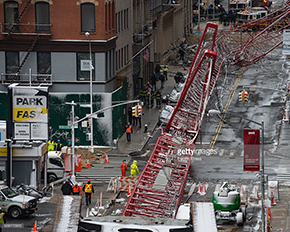 Paul Massey’s impressive war chest
Paul Massey’s impressive war chest
Commercial real estate broker and mayoral hopeful Paul Massey raised $1.6 million in campaign donations over the last six months, outraising Mayor Bill de Blasio by $600K and becoming the most well-financed Republican challenger in the 2017 race, according to DNAInfo and Politico. In the six months leading up to Jan. 11, the Republican, who has already secured the Independence Party’s endorsement, spent $2 million and lent his campaign $1.27 million in additional funding. Unsurprisingly, the real estate and finance sectors made up a significant portion of his donations, including executives at Property Markets Group, CBRE, RFR Holdings’ Aby Rosen, Hudson Companies, Toll Brothers and Massey’s employer, Cushman & Wakefield. De Blasio dismissed the upstart’s campaign, telling NY1, “I don’t think the people of this city are looking for a developer to lead us forward.”
Commercial property taxes to soar in 2017
Commercial property owners are facing a heavier tax burden under Mayor Bill de Blasio, the Wall Street Journal reported. On average, property tax bills prior to abatements for commercial property owners will jump to $111,023 in fiscal 2017, from $85,841 in fiscal 2013. Overall, the average commercial tax bill has gone up 29.3 percent under de Blasio’s tenure. The tax hikes can be attributed to increases in property assessments as well as a small increase in the commercial property tax rate — in 2017 it will shift to 10.574 percent. The number is down compared with last year’s 10.656 percent but up from 2013’s rate of 10.288 percent. The city’s overall tax rate has stayed unchanged under de Blasio, but Maria Doulis, vice president of the Citizens Budget Commission, said commercial property owners pay the largest share of New York City’s property taxes. “Those costs are then passed down to businesses and consumers,” she said.
Council introduces bills on construction safety
City Council members last month introduced a package of 18 bills to ramp up security measures on construction sites, Crain’s New York Business reported. Known as the Construction Safety Act, the legislation includes stricter regulation of cranes and more required oversight of smaller construction sites. Over the last two years, there have been 24 construction fatalities, according to the city’s Department of Buildings. The bills are likely to spark a fight between construction unions and developers over issues such as the use of apprenticeship programs. Mayor de Blasio has already criticized a bill that requires training for construction workers.

Tribeca crane collapse in February 2016
Developers asked to fund school construction
Amid concerns of classroom overcrowding, a group of parent advocates in Manhattan’s largest school district is calling on Mayor de Blasio to make developers pitch in funding for school construction, DNAinfo reported. The District 2 Community Education Council, which oversees schools from Battery Park City to 59th Street on the West Side and 96th Street on the East Side, unanimously voted to pass a resolution asking the de Blasio administration to create a task force to assess enrollment projections as well as analyze whether developers should pay into an “impact fund” for schools and other infrastructure improvements. The group said the city’s enrollment projections are flawed because they don’t take into consideration the sizes of apartment the developers are building. There is a particular concern in the West Village, where developments in Hudson Square are nearing completion. A district in Brooklyn passed a similar resolution in November 2016.
